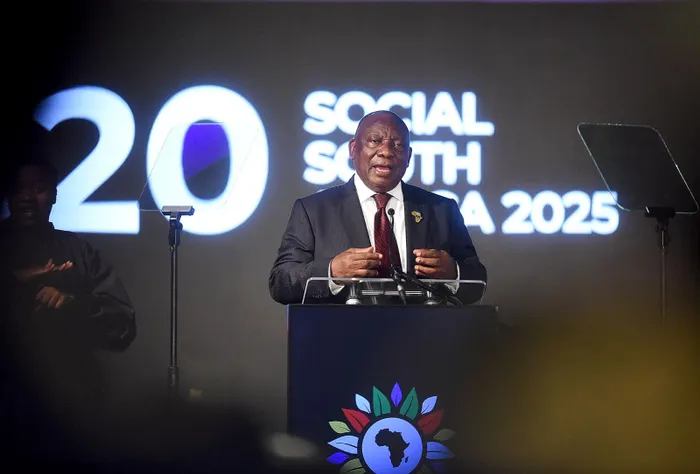Cyril's GBV declaration falls short of urgency, says anti-GBVF group

President Cyril Ramaphosa delivers his closing remarks at the Social Summit at the Birchwood hotel and conference Centre in Boksburg.
Image: Itumeleng English/ Independent Newspapers
PRESIDENT Cyril Ramaphosa’s decision to declare the scourge of gender-based violence and femicide (GBVF) both a national and global crisis falls short on urgency, anti-GBVF advocacy group Ilitha Labantu.
In a move appearing to be in anticipation of Friday’s planned National Shut Down, Ramaphosa declared gender-based violence and femicide (GBVF) both a national and global crisis.
Women's rights organisations have been preparing to picket at various venues in parts of the country to highlight the scourge of GBVF as part of planned G20 Summit-related protests.
Addressing the closing of the G20 Social Summit on Thursday, Ramaphosa said: “No society can thrive for as long as gender-based violence and femicide continue, and the agency of women is denied. The violence perpetrated by men against women erodes the social fabric of nations. Men and women are equal partners and must be actively involved to resolve power imbalances that normalise violence and silencing survivors."
Monakali said labelling GBVF a health crisis without fundamentally addressing the structural conditions that enable it risks reinforcing a cycle of symbolic recognition without transformation.
"Violence against women and children has long been embedded in our social fabric, perpetuated by systemic failures, weak institutional accountability, and an enduring lack of political will. While public declarations have become a recurring feature in our national discourse, particularly under the current administration, they have seldom translated into sustained implementation or measurable impact," he said.
"This moment should therefore mark a departure from episodic dialogue towards comprehensive, properly resourced, survivor-centred intervention, reinforced by strong accountability mechanisms and coordinated action across all sectors of society. Anything less will merely repeat patterns of outrage without systemic change," Monakali stated.
Ramaphosa stated that in South Africa, this process will be sped up as the government is at the centre of protecting its most vulnerable citizens.
"In South Africa, women need support and protection from the government and men. We are now going to classify GBVF as a global crisis to be addressed. We have agreed, among all our social partners, to take concerted efforts to end this crisis," he stated.
Cape Times